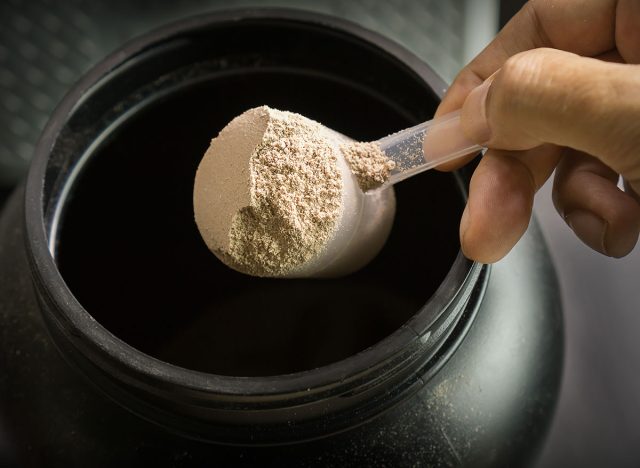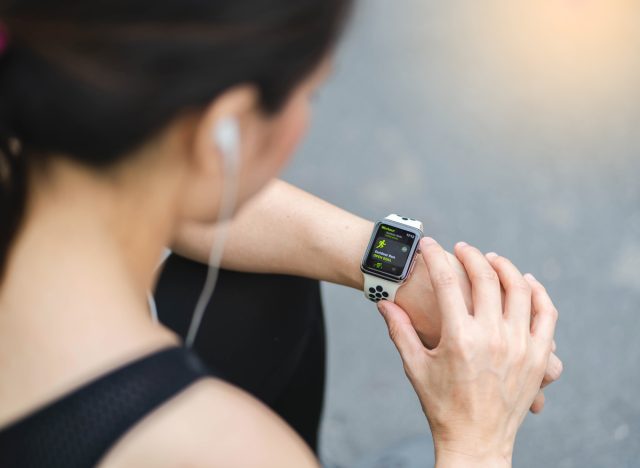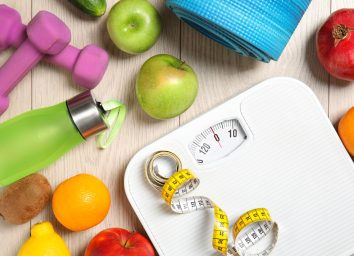
Over time, having too much fat around your abdomen can become harmful to your health. That's because this type of fat, also known as visceral fat, grows around the internal organs in our stomach area.
Too much belly fat like this can increase our risk of heart disease, diabetes, and even complications like cancer or strokes. While this fat can sometimes be difficult to lose, there are ways to do so in a healthy, sustainable manner.
We talked with a few dietitians to get their advice on how you can begin setting goals for your health and losing belly fat today. And for more healthy weight loss tips, check out High-Protein Lunch Recipes for Weight Loss.
Get enough protein

One of the best things you can do for yourself and your goal of losing belly fat is making sure you get enough protein throughout your day. One mistake that people sometimes make is that they cut too many calories to try and lose weight, but they end up not getting enough protein in their meals because of this.
"There are a few key benefits that protein provides in terms of losing weight. First, protein helps build muscle mass and reduce fat, especially in the abdominal area. Second, protein helps you feel full longer, helping you curb your appetite throughout the day and maybe not reach in the pantry for some extra unhealthy snacks. Lastly, eating enough protein daily also provides energy, which you'll need to perform cardio or strength training workouts to help reach your goals," says Courtney D'Angelo, MS, RD, author at Go Wellness.
Swap your cocktail for mocktails

Having a glass of red wine every now and then can potentially provide you with some benefits, but too much alcohol over time can increase your chances of having abdominal fat. In fact, according to a study from the International Journal of Obesity, light to moderate consumption of alcohol was associated with increased visceral fat in adult women.
"Consuming too much alcohol can result in accumulation of belly fat, so instead of drinking martinis and glasses of wine, opt for a glass of 100% pomegranate juice served in a fancy glass or a flute of sparkling water," says Lauren Manaker, MS, RDN, author of The First Time Mom's Pregnancy Cookbook and Fueling Male Fertility.
Drink more water

It's almost pointless to follow any of these other guidelines if you're not getting enough water in your body throughout the day, especially if you can use that water to replace sugary drinks that may be leading to more weight gain.
"Most people are drinking too many sugary sports drinks, soda, and specialty coffees throughout their days. If you drink more water instead of those drinks, you'll drastically reduce the amount of sugar and calories that you're currently consuming. Water also helps you stay hydrated, triggering higher energy levels, which can help cause you to take more action on your overall health and wellness," says D'Angelo.
Prioritize sleep

Similarly to getting enough water and protein during the day, getting enough sleep is also a foundational tool in helping to lose weight.
A report from the Canadian Medical Association Journal concluded that inadequate sleep was not only linked to a greater risk of obesity but was also found to commonly interfere with weight loss attempts.
"Not getting enough sleep can result in weight gain and fat accumulation, so allowing yourself to sleep 7-8 hours every single night may help you lose some stubborn belly fat," says Manaker.
Use an app to count your macros

This method may not work for everyone, so it's important to talk with a doctor or dietitian first. But counting macros has been found to be a successful method in helping some people lose belly fat, and it can allow you more freedom than something like counting calories or other restrictive methods of weight loss.
"Counting macros can help you lose stubborn belly fat, maintain lean muscle mass and keep your body full of energy. This wouldn't be effortless if you had to jot it all down on paper and do the math yourself. However, today there are plenty of legitimate apps out there that can easily help track your macros. The science behind counting macros is that there's not a 'one-size-fits-all' number. Everyone is going to have different weight goals and will need the proper amount of calories, protein, fats, and carbs. This is now easy to do with apps like MyFitnessPal or 1st Phorm," says D'Angelo.









